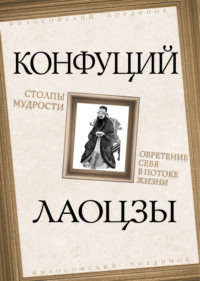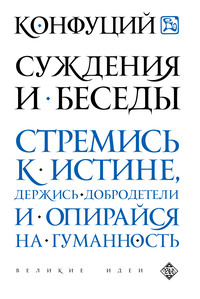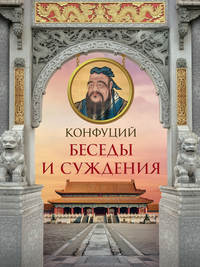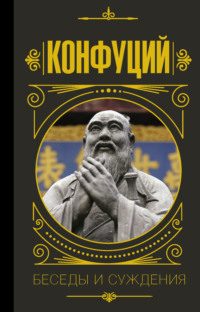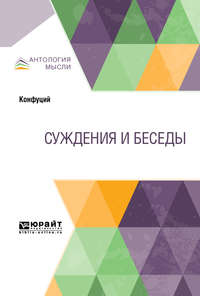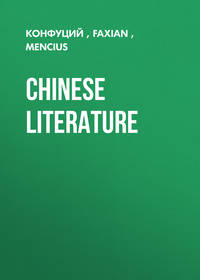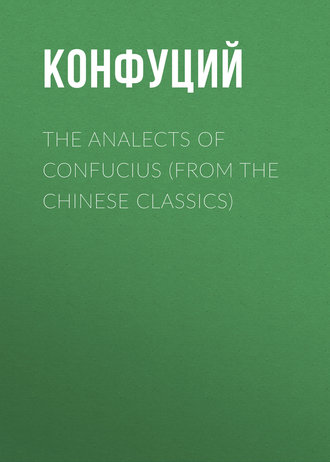 полная версия
полная версияThe Analects of Confucius (from the Chinese Classics)
CHAP. XIV. 1. The Master said, 'What has the lute of Yu to do in my door?' 2. The other disciples began not to respect Tsze-lu. The Master said, 'Yu has ascended to the hall, though he has not yet passed into the inner apartments.'
CHAP. XV. 1. Tsze-kung asked which of the two, Shih or Shang, was the superior. The Master said, 'Shih goes beyond the due mean, and Shang does not come up to it.' 2. 'Then,' said Tsze-kung, 'the superiority is with Shih, I suppose.' 3. The Master said, 'To go beyond is as wrong as to fall short.'
CHAP. XVI. 1. The head of the Chi family was richer than the duke of Chau had been, and yet Ch'iu collected his imposts for him, and increased his wealth. 2. The Master said, 'He is no disciple of mine. My little children, beat the drum and assail him.' CHAP. XVII. 1. Ch'ai is simple. 2. Shan is dull. 3. Shih is specious. 4. Yu is coarse.
CHAP. XVIII. 1. The Master said, 'There is Hui! He has nearly attained to perfect virtue. He is often in want. 2. 'Ts'ze does not acquiesce in the appointments of Heaven, and his goods are increased by him. Yet his judgments are often correct.'
CHAP. XIX. Tsze-chang asked what were the characteristics of the GOOD man. The Master said, 'He does not tread in the footsteps of others, but moreover, he does not enter the chamber of the sage.' CHAP. XX. The Master said, 'If, because a man's discourse appears solid and sincere, we allow him to be a good man, is he really a superior man? or is his gravity only in appearance?'
CHAP. XXI. Tsze-lu asked whether he should immediately carry into practice what he heard. The Master said, 'There are your father and elder brothers to be consulted;– why should you act on that principle of immediately carrying into practice what you hear?' Zan Yu asked the same, whether he should immediately carry into practice what he heard, and the Master answered, 'Immediately carry into practice what you hear.' Kung-hsi Hwa said, 'Yu asked whether he should carry immediately into practice what he heard, and you said, "There are your father and elder brothers to be consulted." Ch'iu asked whether he should immediately carry into practice what he heard, and you said, "Carry it immediately into practice." I, Ch'ih, am perplexed, and venture to ask you for an explanation.' The Master said, 'Ch'iu is retiring and slow; therefore, I urged him forward. Yu has more than his own share of energy; therefore I kept him back.'
CHAP. XXII. The Master was put in fear in K'wang and Yen Yuan fell behind. The Master, on his rejoining him, said, 'I thought you had died.' Hui replied, 'While you were alive, how should I presume to die?'
CHAP. XXIII. 1. Chi Tsze-zan asked whether Chung Yu and Zan Ch'iu could be called great ministers. 2. The Master said, 'I thought you would ask about some extraordinary individuals, and you only ask about Yu and Ch'iu! 3. 'What is called a great minister, is one who serves his prince according to what is right, and when he finds he cannot do so, retires. 4. 'Now, as to Yu and Ch'iu, they may be called ordinary ministers.' 5. Tsze-zan said, 'Then they will always follow their chief;– will they?' 6. The Master said, 'In an act of parricide or regicide, they would not follow him.'
CHAP. XXIV. 1. Tsze-lu got Tsze-kao appointed governor of Pi. 2. The Master said, 'You are injuring a man's son.' 3. Tsze-lu said, 'There are (there) common people and officers; there are the altars of the spirits of the land and grain. Why must one read books before he can be considered to have learned?' 4. The Master said, 'It is on this account that I hate your glib-tongued people.'
CHAP. XXV. 1. Tsze-lu, Tsang Hsi, Zan Yu, and Kung-hsi Hwa were sitting by the Master. 2. He said to them, 'Though I am a day or so older than you, do not think of that. 3. 'From day to day you are saying, "We are not known." If some ruler were to know you, what would you like to do?' 4. Tsze-lu hastily and lightly replied, 'Suppose the case of a State of ten thousand chariots; let it be straitened between other large States; let it be suffering from invading armies; and to this let there be added a famine in corn and in all vegetables:– if I were intrusted with the government of it, in three years' time I could make the people to be bold, and to recognise the rules of righteous conduct.' The Master smiled at him. 5. Turning to Yen Yu, he said, 'Ch'iu, what are your wishes?' Ch'iu replied, 'Suppose a state of sixty or seventy li square, or one of fifty or sixty, and let me have the government of it;– in three years' time, I could make plenty to abound among the people. As to teaching them the principles of propriety, and music, I must wait for the rise of a superior man to do that.' 6. 'What are your wishes, Ch'ih,' said the Master next to Kung- hsi Hwa. Ch'ih replied, 'I do not say that my ability extends to these things, but I should wish to learn them. At the services of the ancestral temple, and at the audiences of the princes with the sovereign, I should like, dressed in the dark square-made robe and the black linen cap, to act as a small assistant.' 7. Last of all, the Master asked Tsang Hsi, 'Tien, what are your wishes?' Tien, pausing as he was playing on his lute, while it was yet twanging, laid the instrument aside, and rose. 'My wishes,' he said, 'are different from the cherished purposes of these three gentlemen.' 'What harm is there in that?' said the Master; 'do you also, as well as they, speak out your wishes.' Tien then said, 'In this, the last month of spring, with the dress of the season all complete, along with five or six young men who have assumed the cap, and six or seven boys, I would wash in the I, enjoy the breeze among the rain altars, and return home singing.' The Master heaved a sigh and said, 'I give my approval to Tien.' 8. The three others having gone out, Tsang Hsi remained behind, and said, 'What do you think of the words of these three friends?' The Master replied, 'They simply told each one his wishes.' 9. Hsi pursued, 'Master, why did you smile at Yu?' 10. He was answered, 'The management of a State demands the rules of propriety. His words were not humble; therefore I smiled at him.' 11. Hsi again said, 'But was it not a State which Ch'iu proposed for himself?' The reply was, 'Yes; did you ever see a territory of sixty or seventy li or one of fifty or sixty, which was not a State?' 12. Once more, Hsi inquired, 'And was it not a State which Ch'ih proposed for himself?' The Master again replied, 'Yes; who but princes have to do with ancestral temples, and with audiences but the sovereign? If Ch'ih were to be a small assistant in these services, who could be a great one?
BOOK XII. YEN YUAN
CHAP. I. 1. Yen Yuan asked about perfect virtue. The Master said, 'To subdue one's self and return to propriety, is perfect virtue. If a man can for one day subdue himself and return to propriety, all under heaven will ascribe perfect virtue to him. Is the practice of perfect virtue from a man himself, or is it from others?' 2. Yen Yuan said, 'I beg to ask the steps of that process.' The Master replied, 'Look not at what is contrary to propriety; listen not to what is contrary to propriety; speak not what is contrary to propriety; make no movement which is contrary to propriety.' Yen Yuan then said, 'Though I am deficient in intelligence and vigour, I will make it my business to practise this lesson.'
CHAP. II. Chung-kung asked about perfect virtue. The Master said, 'It is, when you go abroad, to behave to every one as if you were receiving a great guest; to employ the people as if you were assisting at a great sacrifice; not to do to others as you would not wish done to yourself; to have no murmuring against you in the country, and none in the family.' Chung-kung said, 'Though I am deficient in intelligence and vigour, I will make it my business to practise this lesson.'
CHAP. III. 1. Sze-ma Niu asked about perfect virtue. 2. The Master said, 'The man of perfect virtue is cautious and slow in his speech.' 3. 'Cautious and slow in his speech!' said Niu;– 'is this what is meant by perfect virtue?' The Master said, 'When a man feels the difficulty of doing, can he be other than cautious and slow in speaking?'
CHAP. IV. 1. Sze-ma Niu asked about the superior man. The Master said, 'The superior man has neither anxiety nor fear.' 2. 'Being without anxiety or fear!' said Nui;– 'does this constitute what we call the superior man?' 3. The Master said, 'When internal examination discovers nothing wrong, what is there to be anxious about, what is there to fear?'
CHAP. V. 1. Sze-ma Niu, full of anxiety, said, 'Other men all have their brothers, I only have not.' 2. Tsze-hsia said to him, 'There is the following saying which I have heard:– 3. '"Death and life have their determined appointment; riches and honours depend upon Heaven." 4. 'Let the superior man never fail reverentially to order his own conduct, and let him be respectful to others and observant of propriety:– then all within the four seas will be his brothers. What has the superior man to do with being distressed because he has no brothers?'
CHAP. VI. Tsze-chang asked what constituted intelligence. The Master said, 'He with whom neither slander that gradually soaks into the mind, nor statements that startle like a wound in the flesh, are successful, may be called intelligent indeed. Yea, he with whom neither soaking slander, nor startling statements, are successful, may be called farseeing.'
CHAP. VII. 1. Tsze-kung asked about government. The Master said, 'The requisites of government are that there be sufficiency of food, sufficiency of military equipment, and the confidence of the people in their ruler.' 2. Tsze-kung said, 'If it cannot be helped, and one of these must be dispensed with, which of the three should be foregone first?' 'The military equipment,' said the Master. 3. Tsze-kung again asked, 'If it cannot be helped, and one of the remaining two must be dispensed with, which of them should be foregone?' The Master answered, 'Part with the food. From of old, death has been the lot of all men; but if the people have no faith in their rulers, there is no standing for the state.'
CHAP. VIII. 1. Chi Tsze-ch'ang said, 'In a superior man it is only the substantial qualities which are wanted;– why should we seek for ornamental accomplishments?' 2. Tsze-kung said, 'Alas! Your words, sir, show you to be a superior man, but four horses cannot overtake the tongue. 3. Ornament is as substance; substance is as ornament. The hide of a tiger or a leopard stripped of its hair, is like the hide of a dog or a goat stripped of its hair.'
CHAP. IX. 1. The Duke Ai inquired of Yu Zo, saying, 'The year is one of scarcity, and the returns for expenditure are not sufficient;– what is to be done?' 2. Yu Zo replied to him, 'Why not simply tithe the people?' 3. 'With two tenths, said the duke, 'I find it not enough;– how could I do with that system of one tenth?' 4. Yu Zo answered, 'If the people have plenty, their prince will not be left to want alone. If the people are in want, their prince cannot enjoy plenty alone.'
CHAP. X. 1. Tsze-chang having asked how virtue was to be exalted, and delusions to be discovered, the Master said, 'Hold faithfulness and sincerity as first principles, and be moving continually to what is right;– this is the way to exalt one's virtue. 2. 'You love a man and wish him to live; you hate him and wish him to die. Having wished him to live, you also wish him to die. This is a case of delusion. 3. '"It may not be on account of her being rich, yet you come to make a difference."'
CHAP. XI. 1. The Duke Ching, of Ch'i, asked Confucius about government. 2. Confucius replied, 'There is government, when the prince is prince, and the minister is minister; when the father is father, and the son is son.' 3. 'Good!' said the duke; 'if, indeed; the prince be not prince, the minister not minister, the father not father, and the son not son, although I have my revenue, can I enjoy it?'
CHAP. XII. 1. The Master said, 'Ah! it is Yu, who could with half a word settle litigations!' 2. Tsze-lu never slept over a promise.
CHAP. XIII. The Master said, 'In hearing litigations, I am like any other body. What is necessary, however, is to cause the people to have no litigations.'
CHAP. XIV. Tsze-chang asked about government. The Master said, 'The art of governing is to keep its affairs before the mind without weariness, and to practise them with undeviating consistency.'
CHAP. XV. The Master said, 'By extensively studying all learning, and keeping himself under the restraint of the rules of propriety, one may thus likewise not err from what is right.'
CHAP. XVI. The Master said, 'The superior man seeks to perfect the admirable qualities of men, and does not seek to perfect their bad qualities. The mean man does the opposite of this.'
CHAP. XVII. Chi K'ang asked Confucius about government. Confucius replied, 'To govern means to rectify. If you lead on the people with correctness, who will dare not to be correct?'
CHAP. XVIII. Chi K'ang, distressed about the number of thieves in the state, inquired of Confucius how to do away with them. Confucius said, 'If you, sir, were not covetous, although you should reward them to do it, they would not steal.'
CHAP. XIX. Chi K'ang asked Confucius about government, saying, 'What do you say to killing the unprincipled for the good of the principled?' Confucius replied, 'Sir, in carrying on your government, why should you use killing at all? Let your evinced desires be for what is good, and the people will be good. The relation between superiors and inferiors, is like that between the wind and the grass. The grass must bend, when the wind blows across it.'
CHAP. XX. 1. Tsze-chang asked, 'What must the officer be, who may be said to be distinguished?' 2. The Master said, 'What is it you call being distinguished?' 3. Tsze-chang replied, 'It is to be heard of through the State, to be heard of throughout his clan.' 4. The Master said, 'That is notoriety, not distinction. 5. 'Now the man of distinction is solid and straightforward, and loves righteousness. He examines people's words, and looks at their countenances. He is anxious to humble himself to others. Such a man will be distinguished in the country; he will be distinguished in his clan. 6. 'As to the man of notoriety, he assumes the appearance of virtue, but his actions are opposed to it, and he rests in this character without any doubts about himself. Such a man will be heard of in the country; he will be heard of in the clan.'
CHAP. XXI. 1. Fan Ch'ih rambling with the Master under the trees about the rain altars, said, 'I venture to ask how to exalt virtue, to correct cherished evil, and to discover delusions.' 2. The Master said, 'Truly a good question! 3. 'If doing what is to be done be made the first business, and success a secondary consideration;– is not this the way to exalt virtue? To assail one's own wickedness and not assail that of others;– is not this the way to correct cherished evil? For a morning's anger to disregard one's own life, and involve that of his parents;– is not this a case of delusion?'
CHAP. XXII. 1. Fan Ch'ih asked about benevolence. The Master said, 'It is to love all men.' He asked about knowledge. The Master said, 'It is to know all men.' 2. Fan Ch'ih did not immediately understand these answers. 3. The Master said, 'Employ the upright and put aside all the crooked;– in this way the crooked can be made to be upright.' 4. Fan Ch'ih retired, and, seeing Tsze-hsia, he said to him, 'A Little while ago, I had an interview with our Master, and asked him about knowledge. He said, 'Employ the upright, and put aside all the crooked;– in this way, the crooked will be made to be upright.' What did he mean?' 5. Tsze-hsia said, 'Truly rich is his saying! 6. 'Shun, being in possession of the kingdom, selected from among all the people, and employed Kao-yao, on which all who were devoid of virtue disappeared. T'ang, being in possession of the kingdom, selected from among all the people, and employed I Yin, and all who were devoid of virtue disappeared.'
CHAP. XXIII. Tsze-kung asked about friendship. The Master said, 'Faithfully admonish your friend, and skillfully lead him on. If you find him impracticable, stop. Do not disgrace yourself.'
CHAP. XXIV. The philosopher Tsang said, 'The superior man on grounds of culture meets with his friends, and by their friendship helps his virtue.'
BOOK XIII. TSZE-LU
CHAP. I. 1. Tsze-lu asked about government. The Master said, 'Go before the people with your example, and be laborious in their affairs.' 2. He requested further instruction, and was answered, 'Be not weary (in these things).'
CHAP. II. 1. Chung-kung, being chief minister to the Head of the Chi family, asked about government. The Master said, 'Employ first the services of your various officers, pardon small faults, and raise to office men of virtue and talents.' 2. Chung-kung said, 'How shall I know the men of virtue and talent, so that I may raise them to office?' He was answered, 'Raise to office those whom you know. As to those whom you do not know, will others neglect them?'
CHAP. III. 1. Tsze-lu said, 'The ruler of Wei has been waiting for you, in order with you to administer the government. What will you consider the first thing to be done?' 2. The Master replied, 'What is necessary is to rectify names.' 3. 'So, indeed!' said Tsze-lu. 'You are wide of the mark! Why must there be such rectification?' 4. The Master said, 'How uncultivated you are, Yu! A superior man, in regard to what he does not know, shows a cautious reserve. 5. 'If names be not correct, language is not in accordance with the truth of things. If language be not in accordance with the truth of things, affairs cannot be carried on to success. 6. 'When affairs cannot be carried on to success, proprieties and music will not flourish. When proprieties and music do not flourish, punishments will not be properly awarded. When punishments are not properly awarded, the people do not know how to move hand or foot. 7. 'Therefore a superior man considers it necessary that the names he uses may be spoken appropriately, and also that what he speaks may be carried out appropriately. What the superior man requires, is just that in his words there may be nothing incorrect.'
CHAP. IV. 1. Fan Ch'ih requested to be taught husbandry. The Master said, 'I am not so good for that as an old husbandman.' He requested also to be taught gardening, and was answered, 'I am not so good for that as an old gardener.' 2. Fan Ch'ih having gone out, the Master said, 'A small man, indeed, is Fan Hsu! 3. If a superior love propriety, the people will not dare not to be reverent. If he love righteousness, the people will not dare not to submit to his example. If he love good faith, the people will not dare not to be sincere. Now, when these things obtain, the people from all quarters will come to him, bearing their children on their backs;– what need has he of a knowledge of husbandry?'
CHAP. V. The Master said, 'Though a man may be able to recite the three hundred odes, yet if, when intrusted with a governmental charge, he knows not how to act, or if, when sent to any quarter on a mission, he cannot give his replies unassisted, notwithstanding the extent of his learning, of what practical use is it?'
CHAP. VI. The Master said, 'When a prince's personal conduct is correct, his government is effective without the issuing of orders. If his personal conduct is not correct, he may issue orders, but they will not be followed.'
CHAP. VII. The Master said, 'The governments of Lu and Wei are brothers.'
CHAP. VIII. The Master said of Ching, a scion of the ducal family of Wei, that he knew the economy of a family well. When he began to have means, he said, 'Ha! here is a collection!' When they were a little increased, he said, 'Ha! this is complete!' When he had become rich, he said, 'Ha! this is admirable!'
CHAP. IX. 1. When the Master went to Wei, Zan Yu acted as driver of his carriage. 2. The Master observed, 'How numerous are the people!' 3. Yu said, 'Since they are thus numerous, what more shall be done for them?' 'Enrich them,' was the reply. 4. 'And when they have been enriched, what more shall be done?' The Master said, 'Teach them.'
CHAP. X. The Master said, 'If there were (any of the princes) who would employ me, in the course of twelve months, I should have done something considerable. In three years, the government would be perfected.'
CHAP. XI. The Master said, '"If good men were to govern a country in succession for a hundred years, they would be able to transform the violently bad, and dispense with capital punishments." True indeed is this saying!'
CHAP. XII. The Master said, 'If a truly royal ruler were to arise, it would still require a generation, and then virtue would prevail.'
CHAP. XIII. The Master said, 'If a minister make his own conduct correct, what difficulty will he have in assisting in government? If he cannot rectify himself, what has he to do with rectifying others?'
CHAP. XIV. The disciple Zan returning from the court, the Master said to him, 'How are you so late?' He replied, 'We had government business.' The Master said, 'It must have been family affairs. If there had been government business, though I am not now in office, I should have been consulted about it.'
CHAP. XV. 1. The Duke Ting asked whether there was a single sentence which could make a country prosperous. Confucius replied, 'Such an effect cannot be expected from one sentence. 2. 'There is a saying, however, which people have— "To be a prince is difficult; to be a minister is not easy." 3. 'If a ruler knows this,– the difficulty of being a prince,– may there not be expected from this one sentence the prosperity of his country?' 4. The duke then said, 'Is there a single sentence which can ruin a country?' Confucius replied, 'Such an effect as that cannot be expected from one sentence. There is, however, the saying which people have— "I have no pleasure in being a prince, but only in that no one can offer any opposition to what I say!" 5. 'If a ruler's words be good, is it not also good that no one oppose them? But if they are not good, and no one opposes them, may there not be expected from this one sentence the ruin of his country?'
CHAP. XVI. 1. The Duke of Sheh asked about government. 2. The Master said, 'Good government obtains, when those who are near are made happy, and those who are far off are attracted.'
CHAP. XVII. Tsze-hsia, being governor of Chu-fu, asked about government. The Master said, 'Do not be desirous to have things done quickly; do not look at small advantages. Desire to have things done quickly prevents their being done thoroughly. Looking at small advantages prevents great affairs from being accomplished.'
CHAP. XVIII. 1. The Duke of Sheh informed Confucius, saying, 'Among us here there are those who may be styled upright in their conduct. If their father have stolen a sheep, they will bear witness to the fact.' 2. Confucius said, 'Among us, in our part of the country, those who are upright are different from this. The father conceals the misconduct of the son, and the son conceals the misconduct of the father. Uprightness is to be found in this.'
CHAP. XIX. Fan Ch'ih asked about perfect virtue. The Master said, 'It is, in retirement, to be sedately grave; in the management of business, to be reverently attentive; in intercourse with others, to be strictly sincere. Though a man go among rude, uncultivated tribes, these qualities may not be neglected.'
CHAP. XX. 1. Tsze-kung asked, saying, 'What qualities must a man possess to entitle him to be called an officer? The Master said, 'He who in his conduct of himself maintains a sense of shame, and when sent to any quarter will not disgrace his prince's commission, deserves to be called an officer.' 3. Tsze-kung pursued, 'I venture to ask who may be placed in the next lower rank?' And he was told, 'He whom the circle of his relatives pronounce to be filial, whom his fellow-villagers and neighbours pronounce to be fraternal.' 3. Again the disciple asked, 'I venture to ask about the class still next in order.' The Master said, 'They are determined to be sincere in what they say, and to carry out what they do. They are obstinate little men. Yet perhaps they may make the next class.' 4. Tsze-kung finally inquired, 'Of what sort are those of the present day, who engage in government?' The Master said 'Pooh! they are so many pecks and hampers, not worth being taken into account.'



